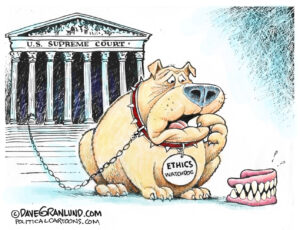Google’s ‘Don’t Be Evil’ Slogan Is a Load of Hooey—or Is It?
The Internet giant has had its hand in quite a few immoralities as of late, even though the company once claimed to be founded on the principle of "good" and the avoidance of "evil." Was it all just a lie, or does "evil" simply mean something entirely different to Google? Author and game designer Ian Bogost has some alarming ideas on the subject.
The Internet giant has had its hand in quite a few immoralities as of late, including letting the NSA in on your private information, and most recently, using your face to endorse products without consent. It’s come a long way since the days when founders Larry Page and Sergey Brin stated Google would be “a company that does good things for the world even if we forgo some short term gains.” Author and game designer Ian Bogost wrote a piece for The Atlantic on Tuesday that pokes holes in Google’s phrasing and in the “Don’t be evil” slogan the company never truly upheld, at least not to the public’s understanding:
As happens every time the search giant does something unseemly, Google’s plan to turn its users into unwitting endorsers has inspired a new round of jabs at Google’s famous slogan “Don’t be evil.” While Google has deemphasized the motto over time, it remains prominent in the company’s corporate code of conduct, and, as a cornerstone of its 2004 Founder’s IPO Letter, the motto has become an inescapable component of the company’s legacy.
Famous though the slogan might be, its meaning has never been clear…. what counts as “good things,” and who constitutes “the world?” The slogan’s significance has likely changed over time, but today it seems clear that we’re misunderstanding what “evil” means to the company. For today’s Google, evil isn’t tied to malevolence or moral corruption, the customary senses of the term. Rather, it’s better to understand Google’s sense of evil as the disruption of its brand of (computational) progress.
Of course, Google doesn’t say so in as many words; the company never defines “evil” directly. But when its executives talk about evil, they leave us clues. In a 2003 Wired profile of the company, Josh McHugh noted that while other large companies maintain lengthy corporate codes of conduct, Google’s entire policy was summarized by just those three words, “Don’t be evil.” While there’s some disagreement about its origins, Gmail creator Paul Buchheit reportedly conceived of the slogan, calling it “kind of funny” and “a bit of a jab at a lot of the other companies, especially our competitors, who at the time, in our opinion, were kind of exploiting the users to some extent.”
In rejoinders of Google’s dubious fidelity to the motto, most assume that the company was once virtuous and has either fallen from grace, or that it has been forced to compromise its values for the market. Even ten years ago, McHugh explained the situation as a side-effect of growth, explaining how difficult it was for Google to maintain a Tron-style “fight for the users” ideal in an enormously influential global information company. Others see it as a foil. In his book The Googlization of Everything, Siva Vaidhyanathan observes that the “Don’t be evil” slogan “distracts us from carefully examining the effects of Google’s presence and activity in our lives.” True, but the slogan itself also counts as one such activity. Understanding what evil means to Google might be central to grasping its role in contemporary culture….
All moral codes are grounded in something: a religious tradition, a philosophical doctrine, a cultural practice. Google’s take on virtue doesn’t reject such grounds so much as create a new one: the process of googlization itself. If anything, Google’s motto seems to have largely succeeded at reframing “evil” to exclude all actions performed by Google….
Companies like Google actually embody a particular notion of progress rather than populism, one that involves advancing their technology solutions as universal ones. Evil is vicious because it inhibits this progress. If Google has made a contribution to moral philosophy, it amounts to a devout faith in its own ability to preside over virtue and vice through engineering. The unwitting result: We’ve not only outsourced our email hosting and office suite provisioning to Google, but also our information ethics. Practically speaking, isn’t it just easier to let Google manage right and wrong?
…when you consider Google’s bad behavior, the choices that strike many as low are neither banal evils nor sociopathic ones. They are conducted in plain sight, as official service offerings. They are presented through magnanimity rather than savagery. When those choices seem underhanded to us, at odds with the motto “Don’t be evil,” they do so not because of the policies they entail, such as using your activity on the web as unauthorized endorsements for paid advertising. Those acts are par for the course, alas. All companies, particularly public ones, exist to maximize their own benefit. Google never claimed otherwise; even in 2004 “Don’t be evil” mostly clarified that the company wouldn’t sprint to short-term gains.
Rather, our discomfort is an expression of the dissonance between ours and Google’s understandings of evil. Google has managed to pass off the pragmatic pursuit of its own ends as if it were the general avoidance of wickedness. It has invested those ends with virtue, and it has publicized the fact that anything good for Google is also good for society. This is a brazen move, and it’s no wonder it takes us by surprise.
Google has successfully redefined “evil” to suit its own purposes, to advance its agenda and thus, in some warped way, it’s still upholding its motto. As Bogost’s piece reminds us, the “Internet industry is committed only to itself, to the belief that its principles should apply to everyone.” The question is, should Google have the power to change our moral codes without our input?
Google does believe it knows you better than you know yourself these days, collecting data about you that perhaps even your subconscious has failed to process. But before we hand over our thoughts and philosophies completely to the company, Bogost seems to encourage us to try to take back some control over our lives, “ponder this strange new evil, roll it around in our heads rather than just Googling for its meaning.”
—Posted by Natasha Hakimi
Your support matters…Independent journalism is under threat and overshadowed by heavily funded mainstream media.
You can help level the playing field. Become a member.
Your tax-deductible contribution keeps us digging beneath the headlines to give you thought-provoking, investigative reporting and analysis that unearths what's really happening- without compromise.
Give today to support our courageous, independent journalists.






You need to be a supporter to comment.
There are currently no responses to this article.
Be the first to respond.